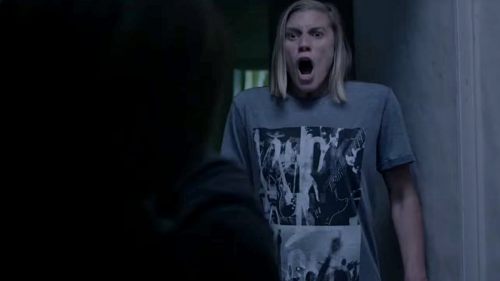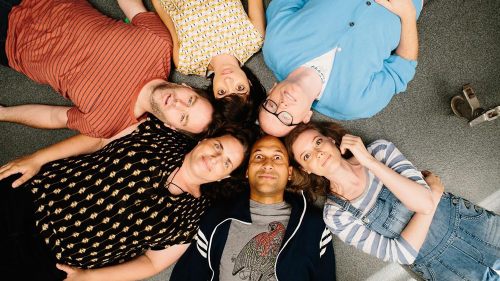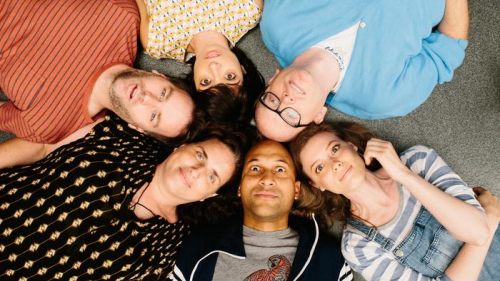Birth.Movies.Interview: Mike Birbiglia And Chris Gethard Discuss DON’T THINK TWICE
ImprovBoston is an institution in Boston’s comedy scene, both as a performance team and as a place of learning for up and coming comedians, so maybe it’s only right that the press day for Mike Birbiglia’s new film, Don’t Think Twice, was held at the company’s theater complex in Central Square. It’s a movie that’s explicitly about improv comedians, and yet it isn’t explicitly for improv comedians; the scenario driving its plot isn’t limited only to the comedy world. In fact, it could happen in any world, and to any group of people, whether they’re related to each other professionally, personally, or both. Maybe think of it this way: have you ever had a friend succeed in life more than you, and if yes, did you envy or kind of hate them for it?
I sat down with Mike and one of his co-stars, improv comedian and actor Chris Gethard, at ImprovBoston and hashed out those questions and concerns, among many others, with both of them. Don’t Think Twice may strike more a vulnerable nerve for comics of all makes and models, but the film works on a level that’s accessible to everyone: chefs, game designers, athletes, dancers, and, I don’t know, let’s say movie critics, too. That’s the point, of course, but it sounds like a risk on paper even if it works splendidly in practice.
As we talked about the movie’s appeal, we wound our way around the subject of how many bad movies get released into multiplexes, why movies like Don’t Think Twice should matter more to the movie industry, Quentin Tarantino’s pitching process, Mike’s approach as a filmmaker, and Gillian Jacob’s ballsiness.
BMD: It’s pretty cool: The last time that I was here, I was watching my brother in law perform in one of the classes here.
Mike Birbiglia: Oh, nice!
Chris Gethard: Oh, that’s cool!
MB: Yeah, they’re doing a workshop right now. It’s cool.
BMD: It is!
MB: It’s a really nice theater. It’s one of the nicest improv theaters that I’ve seen in the country, and we’ve been going everywhere, so.
BMD: It is really nice. I was kind of excited that you guys were going to be coming here, as opposed to, like, the Liberty [Hotel] or the Eliot [Hotel]. It feels really appropriate. Is there something about being here specifically that’s exciting for you, that makes this a better experience?
MB: Yeah. There’s an energy to being in spaces like this. There’s just good comedy ghosts in the walls.
BMD: I can believe that. So it’s been, what, four years since Sleepwalk With Me?
MB: Yeah, 2012.
BMD: What took you so long? I’ve been waiting for a long time!
MB: Everybody says this to me. It’s so hard to make movies. People take for granted, like, how...I mean, how long does it take Tarantino? Five years? Four years?
BMD: Yeah, long, long time.
MB: Yeah.
CG: And that’s all he has to think about!
MB: I’m a stand-up, too. I’m putting out specials, one-man shows…
BMD. Of course. You’ve been busy.
MB: I’m going to try to get the number down to about two to three years. This one took four years. You know, they always say sophomore films take a long time to get out, because you essentially learn so much in your first film that it takes a long time to even register what you learned, and how you’re going to improve upon it. I think four years was the right amount of time.
BMD: As long as it takes!
MB: As long as it takes. You gotta remember: It’s not TV. We’re trying to make something that’s not ephemeral. We’re trying to make something that is for all time. I was saying to these guys while we were making the movie, “We want to make a movie that people are seeing twenty or thirty years from now.” I want this movie to be like The Big Chill, or Hannah and Her Sisters, or Broadcast News, where people are watching this for years.
BMD: I really hope it hits that. I’m not an improv comedian - obviously, I’m a journalist, I’m a critic - but this movie resonated with me much more than I expected it to. I’ll certainly be revisiting it. It’s universal, which I think is pretty incredible.
MB: Thanks! That’s the hope.
BMD: While you guys were making this movie, were you thinking to yourselves, “This is really only going to appeal to people who do improv or are in the comedy world,” or did you expect it to hit nerves for everybody?
CG: I had that fear for sure. You know, as someone who has been heavily involved in the improv world as long as I have, I was like, “Who’s going to care?” But it is a great compliment to Mike that I think he saw what was really universal inside that, and saw how much the ideas of competition and ego exist everywhere, and how that world in particular was a real fertile ground to show those themes off.
MB: Yeah. And the other thing is, like, I read that Tarantino will tell people his movies on the phone. He just pitches everybody, you know? “The movie’s about blah blah blah blah blah blah blah!”
BMD: I bet it’s just like that, too. [laughs]
MB: Yeah, yeah! Apparently he doesn’t even have to hear laughter, or not, to know whether it works. And I would pitch this movie to people and it just worked. I would say, “I have this movie idea, and it’s about a group of people who are best friends, and they’re in an improv group, and one of them gets on kind of an SNL-type show, and the rest of them don’t,” and people go, “Yes.” And I’m talking about people in show business, not in show business, friends from high school, like, you know, brothers, sisters; everybody who I pitched this too, they were like, “Oof. I know that feeling, man.”
So that’s how I knew. Then I had, like, ten readings of this at my house. Chris and Tami [Sagher] would come, and I would invite over crazy people, I mean, like, people I don’t deserve to have at my house: Nicole Holofcener, Phil Lord, Michael Weber, Brian Koppelman, Frank Oz, and Ira Glass, to give notes. We would do the readings out loud, and you could feel it. You could feel it at all those stages. It wasn’t there yet, but something was there. At the core, this is going to work. This could work.
BMD: I think that’s absolutely right; it definitely works, and it’s very specific but it has a lot of broad appeal.
MB: We’re hoping...no one is going to get rich on the movie just because the size and scope of the movie is not such, but I actually would love for it to break wide and go on five hundred thousand screens to prove to studios that people can make movies about human beings, and friendships, and emotions, and have it make money for them. I’m so sick of walking into multiplexes at the mall, and...Ira Glass and I did a Q&A at a multiplex in Jersey recently, and we popped into 20 minutes of each movie. I mean, it’s a lot of garbage!
BMD: I can attest to that. I watch a lot of that garbage, too!
MB: The only one that wasn’t that, of the ones we watch, was Favreau’s. The Jungle Book. I didn’t see the whole movie, but I was like, “This is interesting.” And then someone was like, “Oh, Jon Favreau directed it.” I was like, “Okay! That explains it.”
BMD: “Mystery solved!”
MB: Yeah, yeah!
BMD: I would love for that too. I think it’s valuable to have movies like this hit a wide audience. It has a throughline of sweetness and tenderness, but it has these bitter edges to it. It comes from real emotional places for all of you involved. Mike, you’re the author, but Chris, you’re bringing something to Bill that you found in yourself. That’s valuable, and kind of hard to find.
MB: And also, this film wouldn’t have been made like this in the studio system. When these guys would come to readings, I would say to Tami and Chris, “I really appreciate you guys doing this reading. I may not be able to put you in the movie.”
BMD: Wow.
MB: That’s the truth of it. I like to be really upfront with people, and just say, “This might get financed, and the financier might say, ‘We want Claire Danes and Jon Cryer.’” And I might have to say, “Well, it’s Claire Danes and Jon Cryer or it’s not a movie.” I have to make the movie. Luckily, Cold Iron [Pictures], who made Diary of Teenage Girl, they made Swiss Army Man, they stood behind every artistic decision I made. They got behind me.
BMD: That’s really lucky.
MB: Yeah.
BMD: Chris, how does that feel for you, hearing what Mike just said? What does that instill in you going into this?
CG: Well, you know, first of all, it’s the nature of the game. I’ve been an actor for a number of years and dudded out. But it’s also funny, because I think nothing shows off why the emotions of this movie are so real than that story, this idea of, like, life’s not fair. Sometimes other people get handed things that you think you deserve. There are a lot of times in your life where you’ll ask yourself two questions: “Why did that person get that thing?” and “Why didn’t I get it?” It’s just a fact of life that those things happen.
Mike was very upfront about that. It definitely was appreciated that he would just own that ahead of time, but it is the nature of the beast. Life in general isn’t cut and dry, and in the entertainment industry in particular, fairness is not something that’s considered too often. Those conversations, I think, were very valid, but also very illustrative of the actual themes of the movie we were discussing. [Mike laughs.] It kind of became, like, a weird MC Escher painting. [Everyone laughs.]
BMD: There’s something beautiful about that, where the reality of the film intersects with the themes of the thing that you’re making.
I’m curious, what kind of director is Mike? What’s it like working with him? Mike, I know what you’re like as a performer and I’ve watched Sleepwalk With Me, so I have my perspective, but I want to hear from one of your performers.
CG: One of the most remarkable things that was really different than other situations I’ve been in as an actor, is that Mike is someone who’s been very visibly in the trenches as a performer for many years. I’ve shared the stage with Mike many times, be it stand-up, improv, whatever it is, so it was a very great comfort to know that his mindset, his instincts, and his priorities were always, “Artists first,” always, “What can we do on the frontlines of this thing as actors, and as creative minds, to put our best foot forward?”
It was also very weird, because you’ve got this movie where so much of the theme of the movie is about status. It’s about people who are of equal status separating into higher and lower statuses, and meanwhile you’ve got one of the core six people, who inherently is the director, which is a higher status than anyone else on the whole set. So he did a really masterful job of being able to be a member of that group, be a member of that six person collective on-screen that needed to feel like they were on equal footing, while he was also the guy yelling “Cut!” and giving the rest of us notes. [Mike laughs.] That was not an easy job for him, but he did it really well.
One of the things I always laugh at is, there were a lot of times where Mike would come up to me between takes and say, “Oh, so, that thing, you and your wife, you went out of town this weekend, how was that?” “Oh it was good.” Because he and I are friends and know each other. Then he’d be like, “So yeah, this next take, it would help me out a lot if you could maybe just lean towards this direction, maybe slow down that part.” I’d be like, “Oh yeah, cool.” He’d say, “I heard you got this show coming up, how’s that?” Afterwards I would realize that he couched the note in our friendship in a way where he would always say, “It would help me out a lot if you could do this.” For most directors, they’d be like, “This is bad. Change it. You need to change this.” Everything came from the perspective of being within the group with the rest of us, on screen with the rest of us, having the cameras pointed at us with the rest of us.
MB: I love that it’s also a favor. “It would help me out.”
CG: Yeah! A lot of, “Hey, if you could this thing, that would really rub me the right way.”
BMD: “Would you be a lamb and just do this?”
MB: Yeah, yeah!
CG: It was very gentle touching. Once we got through the process, I realize how difficult that must have been for Mike, to be the guy who has to call the shots, but also has to be in there looking the rest of us in the eye, knowing that there’s a real delicate eco system. It could have been poisoned if there were any holes punctured in that. He did a really amazing job of not doing that.
MB: We were lucky, too, because Keegan [-Michael Key], who none of us really knew other than Tami, was really team captain in a lot of ways. He was salt of the earth, nice to every crew member, knew everyone in catering, craft services, and every gaffer, key grip. He would lead singalongs between takes when we were setting things up with extras. I mean, the stuff that Keegan would do to keep morale up was unbelievable. You work on movies sometimes with big stars, and in between setups, they’ll be in their trailers. Fortunately, we couldn’t afford trailers.
BMD: You dodged that problem pretty easily!
CG: Especially with the momentum of Key & Peele at that time, and Keanu...
MB: And Keanu, yeah.
CG: Just the cultural awareness surrounding Keegan as we shot the movie. If anyone had a right to pull rank or be a diva, it was Keegan, and instead he was probably the most relentlessly positive person on set at all times, and that helped so much.
MB: And Gillian, too, because she had never done improv. She came to town three weeks early - all of us did - to do workshops with Liz [Allen] and learn improv. She did real improv! On camera! And she had never done improv before!
CG: Maybe even more scary, on stage in New York!
MB: On stage!
CG: We would do these rehearsals, these improv workshops, and lot of it was a crash course for people that had not done improv, and Mike would be like, “Okay, so, we’re doing a show at UCB at 7:00 tonight.” That’s not the biggest deal in the world at the end of the day, but you think of someone like Gillian who has never done improv, who has status from being on Community and so many other things that people love…
MB: It’s a lot to lose!
CG: To walk up in front of 200 improv fans who are really curious to see how it’s going to go...it’s really, really ballsy and brave, and she dove in headfirst.
MB: By the way - Lena Dunham recommended Gillian. I go, “She’s a great actress, but I don’t see this part in her.” And Lena said something that really stuck with me: She goes, “Gillian Jacobs can do anything.”
BMD: I believe it, man!
CG: She’s totally fearless.
MB: I would put her in any part.



